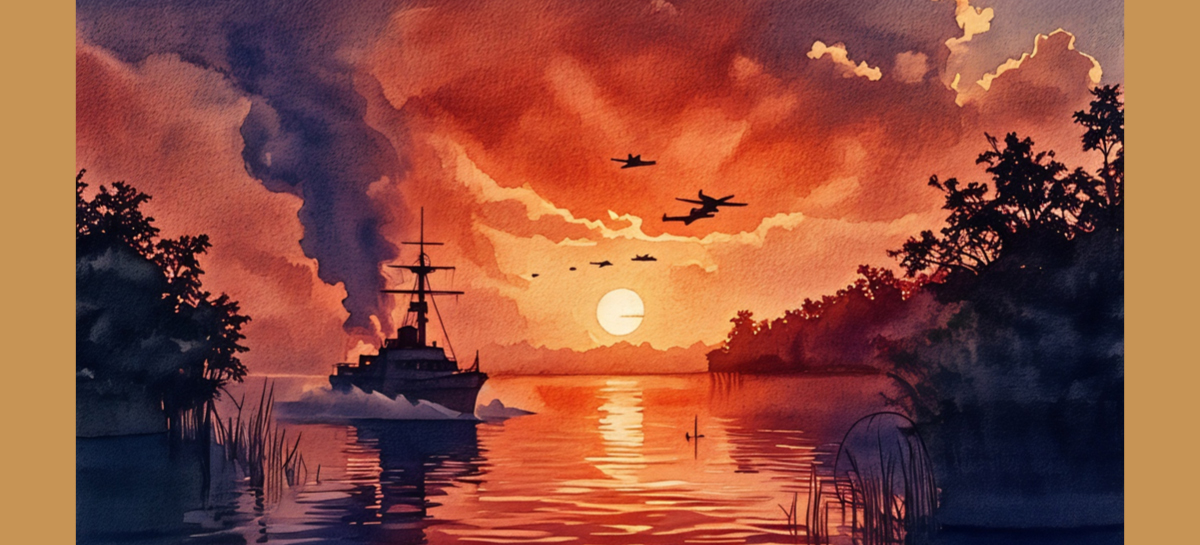Our member Ms M. Mitter shares a powerful memory of her husband’s role in the Bangladesh Liberation War—from covert operations to a near-fatal capture. His courage and quiet endurance remain etched in her memory, a reminder of the sacrifices of those who defend a nation’s freedom.
After my husband graduated from college, he successfully applied for a position in the Indian Navy. His departure was a hurried affair—he reached the naval training base in Bombay on the very last day of joining. By the time he began his service, Ms Indira Gandhi was the Prime Minister and Mr V. V. Giri the President of India.
When the Bangladesh War began, and India had not yet officially joined the conflict, my husband was asked to join covert operations. It was such a sensitive mission that he wasn’t allowed to inform even his family. He oversaw the loading of arms and ammunition and the preparation of submarines at Garden Reach.
He was sent to do a reconnaissance of the Kestopur canal to explore whether it could be used to enter Bangladesh through the Sunderbans. Since the channel had become unnavigable due to heavy siltation, he charted a course through the Khari River instead.
Both the Indian Navy and the Army were training Muktijoddhas—members of the Bangladeshi liberation army. My husband, following orders, selected one of the trainees to accompany him. As the two of them neared the Khulna border, opposition fighter planes began shelling them. Their ship caught fire, and as the commanding officer, my husband had to ensure a full evacuation before he could seek shelter himself.
He was injured in the shelling, and things might have turned fatal if not for the Muktijoddha, who jumped into the water with him. The Razakar soldiers shot the man in the chest, and another bullet grazed his temple, but he managed to swim ashore with my husband.
Though seriously wounded, my husband told the man to leave him behind, reminding him that he had a wife and two daughters to live for. But the brave Muktijoddha replied, “No sir, I won’t leave you!” Years later, I met him. He told me, “Bhaabi, the river was red with the blood of men.”
The Razakars soon closed in. Already unable to move his left hand and rapidly losing strength in his legs, my husband realised that he wouldn’t be able to escape. When the Muktijoddha began taking off his boots to ease his suffering, my husband kicked him hard with his good leg, sending him a few feet away—just in time. Moments later, the Razakars captured him.
He was held hostage in a small hut, laid out on a wooden bench. Another shipmate, Mr Banerjee, had also been arrested and was held in the same hut. My husband asked him for a cigarette. Once he started smoking, the pain dulled slightly, and he began to register his surroundings. He was surrounded by Pakistani soldiers, speaking among themselves.
Meanwhile, the Indian Navy had learned of his capture. The matter escalated through political back channels. One night, he was taken to a hospital. He later told me that when he woke up the next morning, all the wounded patients—on the beds and even on the floor—were gone. They had all died.
When Bangladesh gained independence, my husband was released in a Prisoner of War exchange. On his return journey, the people of Bangladesh wrapped their national flag around him. The Navy later gifted him a used shell as a memento.
He was kept under care at the Barrackpore Military Hospital, and his family was informed that he was alive. Doctors found over 300 shell fragments in his left hand. They advised against surgery, and he lived the rest of his life with limited mobility in that hand. But he was a strong man. He carried his wounds with dignity and lived with a deep and unwavering love for his country.
(as narrated to Support Elders by our member)
Categories
Red Runs the River: An Officer’s Tale

